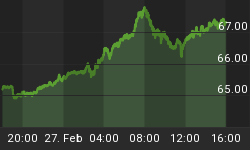Last week, with liquidity concerns reaching a crisis point for Europe, central banks around the world, led by the U.S. Federal Reserve, stepped in to provide emergency measures to insure that the financial gears continue to turn. At the same time, the European Central Bank (ECB) yielded to political pressure to rescue the world's second currency by using an IMF smokescreen to circumvent its own prohibition against making loans directly to member countries. Lastly, Germany indicated possible agreement to provide more bailout funds if Eurozone countries would agree to yield more fiscal sovereignty to German control. Taken together these measures have certainly provided some relief to markets, as the current rally attests, but the long term ramifications are harder to assess.
For decades, European banks have been acquiring what are known as "Eurodollars," which are simply U.S. dollars held by non-U.S. residents. To a large extent, these funds are the result of excess numbers of greenbacks sloshing around the world due to U.S. trade deficits. Trillions of Eurodollars are deposited at European banks, which are usually loaned out on a fractional basis. To redeem these loans, European banks need a steady stream of dollars which they traditionally get in the London-based Eurodollar interbank market. However, as the euro crisis has evolved, U.S. banks have correctly become distrustful of Eurozone bank's exposure to the collapsing sovereign bond market, and have reduced overseas dollar lending. While the ECB can print euros, only the U.S. Fed can print U.S. dollars. Hence the emergence of a dollar liquidity crisis.
Wisely and promptly, in a desperate rescue attempt the Fed agreed with the ECB to a new central bank swap of U.S. dollars for euros at a fixed exchange rate. The ECB was able to provide the dollar liquidity to dollar hungry Eurozone banks. This, in turn, lowered the cost of all other dollar swaps. The relief sent the Dow up 400 points in a single day. From our perspective, by swapping dollars for euros the Federal Reserve is actually taking risk off the table, and the move, in my opinion, does not present a worsening of U.S. finances. However, should the euro collapse, U.S. taxpayers will be on the hook yet again.
But liquidity alone will do little to solve the underlying insolvency of many European nations, which may only be absolved through massive debt forgiveness. However, that problem was swept under the rug yet again by deft political maneuvers.
The ECB was founded on Germanic lines and forbidden, by treaty, to salvage member nations directly. Germany did not want to create a political structure whereby insolvent member nations could easily turn to the central bank for a bailout. To get around this restriction in the current crisis, the ECB suggested it would lend money to the IMF, which is entitled to lend to member nations, and who will in turn make loans that the ECB cannot. As with the dollar swaps the news was greeted with great relief by world stock markets. However, IMF lending would expose non-Eurozone nations to the credit risk of insolvent and soon-to-be downgraded Eurozone sovereign debt. But these risks have been ignored in the face of a global stock rally.
Throughout the whole crisis, Germany has played a subtle but ruthless game. It has used the prospect of an international currency collapse as a means to extend German control over Eurozone governments. To my thinking, this is the latest incarnation of its long held pursuit of a European Empire. This naked exhibition of national self-interest over European cooperation has magnified uncertainty, and it has occurred with the silent endorsement of the UK, which had in the past consistently opposed such power plays. It appears that times have definitely changed, and that fears of an emboldened Germany have not passed into the new century.
In order to win for itself as many economic cards as possible, we can expect Germany to continue playing economic brinksmanship. The high stakes game will continue creating extreme market volatility. Various bodies such as the Fed, ECB, EU, IMF and G-20 likely will continue to issue calming statements in the hope that more smoke and mirrors will cover a building crisis of confidence in paper currencies and sovereign debt. Meanwhile, greatly increased liquidity threatens high future inflation.
In such an environment, precious metals remain a hedge against inflation and a form of insurance against possible catastrophe.
John Browne is a Senior Economic Consultant to Euro Pacific Capital. Opinions expressed are those of the writer, and may or may not reflect those held by Euro Pacific Capital, or its CEO, Peter Schiff.
For an even more in depth look at the prospects of international currencies, download Peter Schiff's and Axel Merk's Five Favorite Currencies for the Next Five Years.
Subscribe to Euro Pacific's Weekly Digest: Receive all commentaries by John Browne, Peter Schiff, and other Euro Pacific commentators delivered to your inbox every Monday.
For a great primer on economics, be sure to pick up a copy of Peter Schiff's hit economic parable, How an Economy Grows and Why It Crashes.















